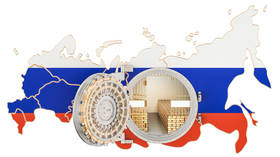Russian exporters ordered to convert most foreign currency to rubles

Russian businesses that trade abroad must sell 80% of their foreign currency earnings and convert them to rubles, the Ministry of Finance said in a statement on Monday. The decision comes in response to sanctions targeting Russia’s financial system over the crisis in Ukraine. It is expected to stabilize the ruble and encourage more investments in Russia instead of moving foreign currency abroad.
“Today, a decision will be made to introduce a mandatory sale of foreign currency in the amount of 80% of their revenue under all foreign trade agreements starting on February 28, 2022,” the statement said.
Effectively, this means that relevant firms must now exchange a vast share of their forex earnings into Russia’s national currency in order to keep the funds within the country, so that they can be spent on national projects instead of investments abroad. The measure has been jointly put forward by the Ministry of Finance and the Russian Central Bank as one of the ways to ensure Russia’s economic stability in the face of Western sanctions, introduced last week following Moscow’s launch of a military operation in Ukraine.
Moscow describes the operation as the “demilitarization” and “denazification” of the neighboring state, while a number of Western nations see it as an “unprovoked” aggression. These nations include the US, EU, Great Britain, and a number of others. The allies jointly hit Russia with various economic sanctions targeting the country’s economy. The US and the EU also announced on Saturday they would freeze the assets of the Russian Central Bank.
Russia has been launching counter-measures of its own. Earlier on Monday, the Central Bank urgently raised the key rate from 9.5 to a record 20% per annum, explaining the move by the “drastic change” in the external conditions for the Russian economy. The Central Bank also announced additional measures to support credit institutions and recommended that banks not charge interest and penalties on loans, as well as allow the restructuring of payments.
For more stories on economy & finance visit RT's business section













